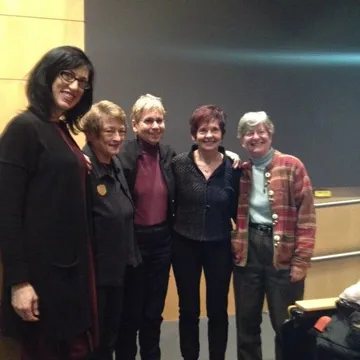Panel Honoring Professor Ackelsberg Offers Window on Smith History
Campus Life

Published February 25, 2015
When Martha Ackelsberg began teaching at Smith in the mid-1970s, the college had not yet had a woman president, women were scarce on the faculty and there was no major or program in women’s studies.
At the time, Ackelsberg recalls, she and many of her graduate school classmates applied for college teaching jobs using their initials instead of first names because they believed that “otherwise, as women, we wouldn’t have had a chance” of being hired.
Ackelsberg, who retired in December as William R. Kenan, Jr., Professor of Government and professor of women and gender studies, shared those recollections at a panel discussion earlier this month on “Four Decades of Change at Smith.”
Also participating were three of her colleagues, also longtime educators at Smith: Donna Robinson Divine, Morningstar Professor Emerita of Jewish Studies and professor emerita of government; Marilyn Schuster, Andrew W. Mellon Professor in the Humanities (Women and Gender); and Susan Van Dyne, professor of women and gender studies. Schuster and Van Dyne are retiring in June.
The gathering was held to honor Ackelsberg, who taught one of Smith’s first courses on gender, and whose scholarly work has illuminated connections between women’s activism and notions of citizenship. At Ackelsberg’s request, the panel also included colleagues who worked with her over four decades to make Smith a more inclusive place for women and people of color.
The discussion offered a window on a rare piece of college history, as panelists described the years-long efforts that led to the founding of the women and gender studies program—along with other changes at Smith. A working group on women’s studies was formed in 1976 but it was not until 1987 that the college established a women’s studies major. In 2005, the program was renamed the study of women and gender.
In introducing the panel, Alice Hearst, chair of the government department, noted that when Ackelsberg and her colleagues began their careers at Smith, “although the second wave of feminism was in flower, few colleges recognized women’s studies.”
Moderator Darcy Buerkle, associate professor of history, cited a study done by Myra Sampson, a retired female faculty member at Smith, showing the small number of women teaching on campus had undergone “a continuous decline” from the late 1950s to the 1970s.
As newcomers to Smith, Ackelsberg said panelists were drawn to each other by their shared interest in social change. In fact, she said she learned about a teaching job at the college from Divine, whom she met on a bus ride to a peace demonstration in Washington, D.C.
Divine said she warned Ackelsberg “not to mention that we met at a march” during her interview at Smith.
“We had shared Shabbat and we sang protest songs in Hebrew, so I said ‘We met at a seminar,’” Divine added, to laughter from the audience.
Panelists soon began working together and with others on campus to create more open and standardized procedures for tenure and promotion at Smith—a first step toward increasing the number of women and people of color on the faculty. They also created the Project on Women and Social Change, an interdisciplinary group that laid the foundation for the current women and gender studies program.
Public lectures, student research opportunities and interdisciplinary courses the project sponsored helped elevate feminist scholarship on campus, Van Dyne said.
“Women’s studies would not have been founded except for people educating themselves on these issues,” she added. “We were convinced we were doing something of monumental importance.”
Others pointed out that the campus culture of the time was far from equitable.
“There were male faculty members who were being recommended for tenure simply because their wives served tea well,” Divine said.
Ackelsberg recalled that admission materials from the 1970s touted the idea that Smith “was a college for women taught predominantly by men.”
The atmosphere changed in 1975, when Jill Ker Conway became Smith’s first woman president.
“It wasn’t just that she was a woman,” Ackelsberg said. “She was a feminist and identified herself that way to the faculty.”
A decade after Conway’s arrival, the college graduated its first group of women’s studies majors.
The Smith course catalogue for 1987-88 describes the goals of that new major as helping students “develop interconnections among the fundamental questions raised by scholarship on women”—including “the intersections of race, class, ethnicity and culture in the constructions and meanings of gender.”
Schuster said such connections are the true legacy of efforts begun 40 years ago by feminist faculty. “Perhaps the greatest change at Smith has been a move away from hostility towards interdisciplinary study to that being what we do,” she noted. “It’s a very different place.”
Ackelsberg credited her colleagues for helping to create an intellectual climate where students and faculty can express their individual identities while also exploring what they share in common.
“It was having the connections among us that made it all possible,” she said.
Carrie Baker, associate professor of women and gender studies and director of the archives concentration at Smith, said hearing the panelist’s stories was inspiring.
“Martha and her colleagues transformed the curriculum and culture at Smith,” Baker said. “This generation of pioneering women was on the cutting edge of some of the most important developments in higher education over the last four decades.”
A video of “Four Decades of Change at Smith” will soon be available in the College Archives Audio-Visual Collection. All four panelists have also donated their papers to the Sophia Smith Collection of Smith College Special Collections.

Participants in a recent panel honoring retiring Smith professor Martha Ackelsberg are (from left): moderator Darcy Buerkle, Marilyn Schuster, Donna Robinson Divine, Susan Van Dyne and Ackelsberg.